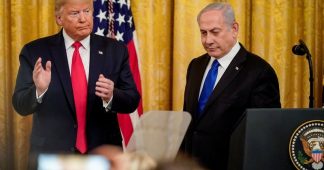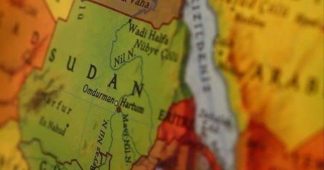In a pre-election maneuver, the Trump administration just pressured Sudan into partially normalizing relations with Israel — but experts warn that the move could backfire, and jeopardize Sudan’s fragile democracy.
Meanwhile, the danger does seem to be receding that Trump will try to bolster his shrinking re-election chances by goading Iran into conflict, but his pliable director of national intelligence did distort a possible Iranian cyber intervention in the U.S. election.
First, Sudan. Trump’s White House announcement about normalization with Israel is exaggerated. The agreement does not include full diplomatic relations and exchange of ambassadors, unlike Israel’s earlier deals with the United Arab Emirates and Bahrain. What’s more, Trump applied considerable pressure on Sudan to reach even the limited arrangement in order to boost his own re-election. As the New York Times noted,
“A senior Sudanese official said his government had bowed to months of American pressure over Israel, despite fears of domestic backlash. . . Sudanese officials have privately complained of being railroaded into a deal over Israel that was driven by American political interests, at a time when Sudan is struggling to get onto its feet.”
Sudan is fragile after emerging from three decades of dictatorship. The country is ruled by a rickety military-political coalition, pending elections scheduled for 2022. An Israeli expert, Yonatan Touval, pointed out in Haaretz that
“Trump is bullying Sudan into embracing Israel. It won’t turn out well.”
Sudan’s civilian leadership is aware that many Sudanese remain sympathetic to the Palestinian cause; protesters burned the Israeli flag in Khartoum. Touval continues:
“… the aggressive manner in which the Trump administration is forcing Sudan’s hand risks undermining the country’s delicate process to democratic rule…”
To get the deal, the U.S. removed Sudan from an American list of state sponsors of terrorism. It is Sudan’s military that pushed for normalization with Israel, chiefly General Mohamed Hamdan Dagalo, known as “Hemeti,” — who is widely known (and hated). He commanded the notorious janjaweed forces that committed widespread killings and torture in western Darfur province in the mid 2000s.
Yonatan Touval asks,
“If normalization with Israel carries the cost of strengthening players like him, it behooves us to ask whether it is worth the benefits, not least for Sudan, but also for Israel.”
Meanwhile, Donald Trump’s director of national intelligence, Dan Ratcliffe, tried to blame Iran for cyber interference in the U.S. election — which suggests that the administration has not entirely given up on its plot to provoke conflict with Teheran. In a comprehensive analysis, the respected National Iranian America Council did acknowledge that Iran may have in fact tried to interfere — but on a far smaller scale than Russia, which Ratcliffe was relatively quiet about. In a New York Times report, a senior U.S. intelligence official said privately that the Iranian action was the equivalent to “playing single A baseball, while the Russians are major leaguers. ”
Published at mondoweiss.net











